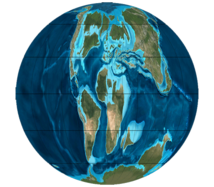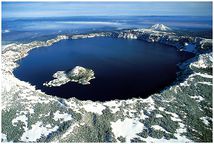Ancient (main)
From The Encyclopedia of Earth
(Redirected from Ancient)
Contents
Ancient
Here you will find further resources on this topic in the CAMEL Collection
========
-
 Featured Article
Featured Article  Antarctic Ice: An 800,000 Year Record of...Antarctic Ice: An 800,000 Year Record of Climate Change provides an extraordinary opportunity for scientists to reconstruct climate events of the past. Scientists have recently... More »
Antarctic Ice: An 800,000 Year Record of...Antarctic Ice: An 800,000 Year Record of Climate Change provides an extraordinary opportunity for scientists to reconstruct climate events of the past. Scientists have recently... More »
Recently Updated
 Ancient Earth: The First Three Billion Years Last Updated on 2010-11-08 00:00:00 The Big Bang, the single point in space and time from which all matter and energy in the universe supposedly emanated, is thought to have occurred sometime around 13.7 Ga (gigayears ago; 1 Ga means 1000 million years ago). Our solar system began to coalesce about 4.5 Ga. When the surface of primitive Earth cooled to a temperature below the boiling point of water, sometime around 4.1 Ga, the atmosphere consisted primarily of gases released from volcanoes. [1] These gases included high concentrations of carbon dioxide (CO2), carbon monoxide (CO), water vapor (H2O), dinitrogen (N2), hydrogen chloride (HCl), and, perhaps, small amounts of methane (CH4). Within a relatively short time, perhaps as early as 3.8 Ga, photosynthetic bacteria (cyanobacteria) were present. [2] Cyanobacteria proliferated widely during the next few billion years. Their photosynthesis depleted the CO2... More »
Ancient Earth: The First Three Billion Years Last Updated on 2010-11-08 00:00:00 The Big Bang, the single point in space and time from which all matter and energy in the universe supposedly emanated, is thought to have occurred sometime around 13.7 Ga (gigayears ago; 1 Ga means 1000 million years ago). Our solar system began to coalesce about 4.5 Ga. When the surface of primitive Earth cooled to a temperature below the boiling point of water, sometime around 4.1 Ga, the atmosphere consisted primarily of gases released from volcanoes. [1] These gases included high concentrations of carbon dioxide (CO2), carbon monoxide (CO), water vapor (H2O), dinitrogen (N2), hydrogen chloride (HCl), and, perhaps, small amounts of methane (CH4). Within a relatively short time, perhaps as early as 3.8 Ga, photosynthetic bacteria (cyanobacteria) were present. [2] Cyanobacteria proliferated widely during the next few billion years. Their photosynthesis depleted the CO2... More »  Milankovitch cycles (Ancient) Last Updated on 2010-07-07 16:09:56 Milankovitch cycles refer to long term variations in the orbit of the Earth which result in changes in climate over periods hundred of thousands of years and are related to ice age cycles. Once Isaac Newton described his laws of motion and of gravity, the orbit of each planet became predictable, not only under the influence the Sun, but the much weaker influences of all the other planets and the Moon as well. Milutin Milankovitch did not discover the cycles, nor was he the first to calculate their changes. He did, though, improve on the methods of calculating them and relating them to Earth’s climatic variations. Here is a brief description of the three cycles. Precession (also called Precession of the Equinoxes): the gravitational pull of the Sun and Moon on Earth’s equatorial bulge causes the poles to slowly wobble. Over 25,800 years, the polar axis... More »
Milankovitch cycles (Ancient) Last Updated on 2010-07-07 16:09:56 Milankovitch cycles refer to long term variations in the orbit of the Earth which result in changes in climate over periods hundred of thousands of years and are related to ice age cycles. Once Isaac Newton described his laws of motion and of gravity, the orbit of each planet became predictable, not only under the influence the Sun, but the much weaker influences of all the other planets and the Moon as well. Milutin Milankovitch did not discover the cycles, nor was he the first to calculate their changes. He did, though, improve on the methods of calculating them and relating them to Earth’s climatic variations. Here is a brief description of the three cycles. Precession (also called Precession of the Equinoxes): the gravitational pull of the Sun and Moon on Earth’s equatorial bulge causes the poles to slowly wobble. Over 25,800 years, the polar axis... More »  Antarctic Ice: An 800,000 Year Record of Climate Change Last Updated on 2009-08-19 00:00:00 Antarctic Ice: An 800,000 Year Record of Climate Change provides an extraordinary opportunity for scientists to reconstruct climate events of the past. Scientists have recently been able to assemble a continuous 800,000 year record of climate change using ice core samples from Antarctica. This record not only contains information relevant to global temperature changes but also contiguous information on tends of atmospheric greenhouse concentrations during the same period. Other scientific sources of information exist that shed light on ancient Earth climate conditions, known as paleoclimate, at various times throughout the 4.5 billion year history of the planet. But the importance of the Antarctic ice record is that it provides a continuous and fairly fine resolution record of climate cycles throughout the entire period of existence of our species, Homo sapiens,... More »
Antarctic Ice: An 800,000 Year Record of Climate Change Last Updated on 2009-08-19 00:00:00 Antarctic Ice: An 800,000 Year Record of Climate Change provides an extraordinary opportunity for scientists to reconstruct climate events of the past. Scientists have recently been able to assemble a continuous 800,000 year record of climate change using ice core samples from Antarctica. This record not only contains information relevant to global temperature changes but also contiguous information on tends of atmospheric greenhouse concentrations during the same period. Other scientific sources of information exist that shed light on ancient Earth climate conditions, known as paleoclimate, at various times throughout the 4.5 billion year history of the planet. But the importance of the Antarctic ice record is that it provides a continuous and fairly fine resolution record of climate cycles throughout the entire period of existence of our species, Homo sapiens,... More » 

